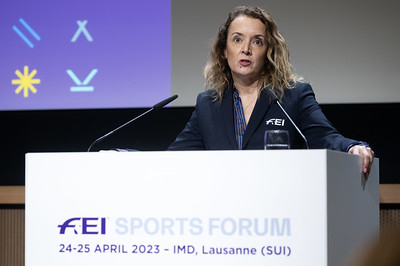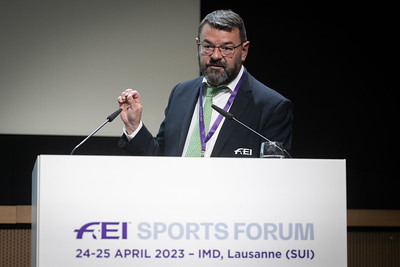 Campus
Campus
Session 4: Cost of Jumping Events, open discussion with the Athletes, Owners, Officials and Organisers
The purpose of this fourth session was to hold an open discussion with Athletes, Owners, Officials and Organisers regarding the costs of Jumping events.
FEI Secretary General Sabrina Ibáñez opened the session to introduce the diverse array of panellists, and the need for consultation and consensus between all the different Jumping stakeholders in order to find a solution which is sustainable and relevant to the community. FEI-CFO Claude Praz went on to provide a detailed overview (available in the FEI Documents Library below) of the financial situation as well as several proposals outlined below which he emphasised were proposals and required discussion and consensus amongst the community.
For the panellists and the delegates, these discussions were essential and ultimately required each and every stakeholder group to ask themselves what they wanted for the sport, the future of the sport and the accessibility for young riders and developing equestrian nations in the upper echelons of the sport.
Prize Money requirements
The subject of prize money conversion and the discrepancy between Europe and the USA when it comes to prize money requirements was brought to the attention of the FEI in 2021 by American Organisers, through their National Federation. Taking a closer look, it rapidly became evident that the system in place since 2012 with the Swiss franc as its base currency to convert prize money, no longer fitted the reality of today’s exchange rates, creating big discrepancies. With the prize money evolving in line with inflation, it had led to a situation where for a CSI 5* event, the percentage difference for Europe was now at -20% while for the USA it was +19% of the total prize money required, reflecting a clear need for adjustment.
A proposal from the FEI for 2024, would be to break away from CHF, and go forward with only two currencies, the EUR and the USD, given that roughly 70% of event prize money was paid in EUR, followed by USD. The EUR would be established as the new base currency and the USD as the second currency, which would be set at today’s exchange rate of 1.10, and help to largely balance out the discrepancies currently experienced.
This new system would evolve in two ways. From August 2023 through to July 2024, the USD exchange rate would be monitored on a monthly basis, of which the average rate of the year would then be used. Secondly, a 5% threshold band would be applied, meaning that if the yearly average exchange rate did not increase or decrease by more than 5%, nothing would change. This way of proceeding would reduce the frequency of change, bring stability and avoid erratic fluctuations. In September 2024, calculations would then be adapted as per the above. FEI-CFO Claude Praz reiterated once again that this was a proposal, and that should this model be approved then it would also be applied to the prize money requirements for Longines Ranking competitions.
Another proposal put forward during the session was the possibility of introducing a minimum prize money requirement for CSI1* events. With a proposed minimum of EUR 15,000. Feelings were mixed in the audience as needs and costs largely differ on a global level. While in Europe, offering little prize money at CSI1* at some events and charging maximum entry fees was concerning, a lot of countries on a more global level benefit from the flexibility of this event category when it comes to the development of the sport, as it allows the OCs and Athletes from developing equestrian nations to gain experience and be a part of the international scene. The FEI provided statistics on this subject (see presentation document below) which demonstrated that per continent and on average, only Europe would currently meet the new proposed prize money requirement for CSI1*, generating some debate from the room. FEI Jumping Committee Chair Stephan Ellenbruch reassured the delegates that the FEI Jumping Committee would be looking at this very carefully and would seek to find solutions which would be relevant to all regions of the world.
Entry fees
Entry fees were another point up for discussion, as over the years, the Jumping community have seen the list of mandatory fees in Jumping schedules expand in various directions, leaving athletes with a substantial amount of extra costs. It was agreed that here too, a consensus needed to be found regarding what constitutes acceptable mandatory fees and that further discussions would be needed.
During the open conversations on the above subjects, what stood out was the global consensus that the entire community was in this together, aiming to drive the discipline forward in a positive way. Costs have risen globally for all stakeholders and now the question arises, how to move forward in a positive and constructive manner?
Peter Bollen, President of Equestrian Organisers (EO), emphasised that the community needed to decide what it wanted for the future and how did they want the sport to evolve, as the equestrian community could not expect the standard of events to continuously increase while the costs decrease. Vice President of EO, Ian Allison stressed the importance of finding a framework that fits all, while the Chairman of the Jumping Owners Club, Dominique Megret also reiterated the importance of finding a balanced system. Athletes were also asked to question their ways when representative of the Chair of the FEI Athletes Committee, Jessica Kürten, touched on the question of athletes attending events to compete and be competitive rather than seeking to gain experience, train their horses or create promotional videos.
The conclusion from the session, following the many discussions and questions, highlighted the need for further consultation amongst the Stakeholder Groups in order to find a system (or systems) which would be relevant to all regions of the world, and sustainable for Athletes and especially the next generation of Riders, as well as Organisers, Owners and Officials.
The FEI-CFO reminded everyone that any changes to the existing system(s) would need approval from either the FEI Board, the IJRC or the FEI General Assembly.
Given the numerous topics requiring attention, the FEI has decided to create a Working group involving its various stakeholders, to take discussions further and find sustainable solutions.
The working group would be composed of:
Read the full Executive Summary here.


© FEI / Richard Juilliart
Panellists:
♦ Mr François Mathy Jr (BEL) - Vice-President, International Jumping Riders Club (IJRC)
♦ Mr Peter Bollen (BEL) - President, Equestrian Organisers
♦ Mr Ian Allison (CAN) - 1st Vice President, Equestrian Organisers
♦ Mr Dominique Mégret (FRA) - President, Jumping Owners Club (JOC)
♦ Mr Ali Küçük (TUR) - Secretary General, International Jumping Officials Club (IJOC)
♦ Mr Gaj Riossa (SLO) - Representative of the International Jumping Riders Club (IJRC)
| Session 4 Documents Library |
| Panellists' biographies (pdf) |
| Executive Summary (pdf) |
We use cookies on this site to enhance your user experience.
By clicking any link on this page you are giving your consent for us to set cookies.